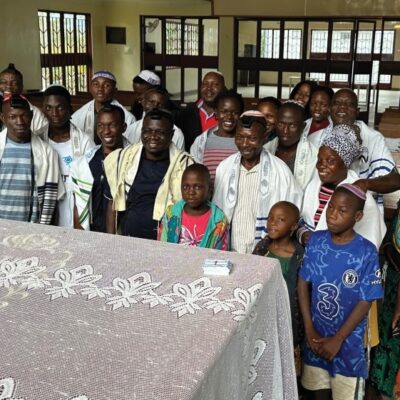ON THE SCENE
At New York gala, Birthright Israel Foundation raises $2.5 million for trip staff, honors Jeffrey R. Solomon
Event features the inauguration of the Jeffrey R. Solomon Award, which will be given annually to a Jewish communal professional who has contributed significantly to Birthright

SARAH KORNBLUH
Illustrative. Participants take part in a Birthright Israel trip.
When the first Birthright Israel group touched down in Tel Aviv in 1999, the scope of what the organization would become was still a pipe dream to its founders. In the years since, Birthright Israel has expanded significantly, bringing over 850,000 young adults to Israel over nearly 25 years.
Last night, at the Harmonie Club, a historically Jewish social club on Manhattan’s Upper East Side, the Birthright Israel Foundation raised $2.5 million to support the training of tour educators and volunteer staff in advance of an event honoring Jeffrey R. Solomon, senior advisor to Chasbro charities and former president of the Andrea and Charles Bronfman Philanthropies, the latter of which helped launch Birthright.
“He’s played such an important role in the development of Birthright, but also in so many other Jewish institutions,” Birthright Israel Foundation board chair, Phil de Toledo, told eJewishPhilanthropy. “There are icons in every generation and Jeff is among them.”
The event, which drew around 200 philanthropists, Birthright educators and Jewish communal professionals, featured the inauguration of the Jeffrey R. Solomon Award. The award, given to antisemitism activist Aviva Klompas, who has staffed 18 Birthright trips, will be given annually to a Jewish communal professional who has contributed significantly to Birthright.
“They do so much in ensuring that our participants see Israel through their eyes and are there to answer any questions,” Elias Saratovsky, president and CEO of the Birthright Israel Foundation, told eJP. “So we want to acknowledge the thousands and thousands of people who have staffed trips, many of whom have staffed multiple trips.”
With Israel’s wars in Gaza and Hezbollah curtailing travel to the Jewish state, Birthright numbers fell this year to 20,000 participants, including for its new volunteer mission, down from 30,000 in 2023, with a 20,000-person waitlist. At its peak in 2018, Birthright drew 48,000 participants. Saratovsky told eJP that he anticipates a backlog of people who are waiting for the security situation to improve. Since Israel reached a cease-fire with Hezbollah in Lebanon in late November, Birthright has already seen an uptick in applications, he noted.
While enrollment has dipped, the foundation has seen an increase in philanthropic support, expecting to raise upwards of $80 million this year, according to de Toledo. Over the next five years, with a goal of sending 200,000 young adults on a Birthright program, the foundation hopes to double its fundraising, de Toledo told eJP.
In his remarks, Solomon spoke of Birthright’s origin story, highlighting Charles Bronfman, Michael Steinhardt and the other original funders, including Sheldon Adelson, who funded Birthright’s first five years, alongside $70 million in support from the Israeli government.
“Those 14 original funders deserve enormous credit. But it was very soon that we discovered we’re not going to have [many funders donating millions of dollars], and the idea of creating the Birthright Foundation emerged [to better facilitate smaller donations],” said Solomon. “Since 1975, in the United States, 250,000 nonprofits have started. Eleven reached the scale of a $50 million-a-year budget. [With] Birthright, the budget is three times that. It’s not an extraordinary Jewish story, it’s an extraordinary American story,” he said.













